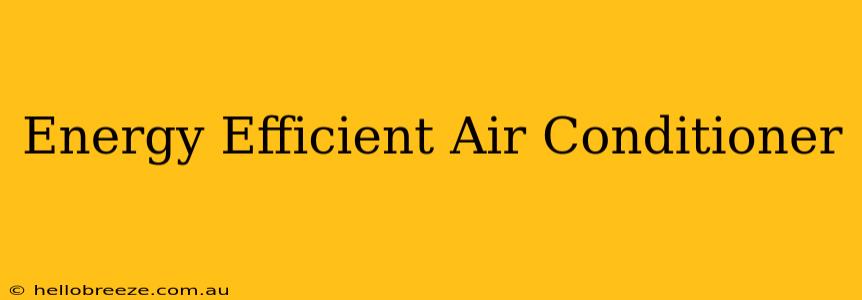Summer's scorching temperatures can leave you sweating, but your wallet doesn't have to. Choosing an energy-efficient air conditioner is crucial for staying cool while keeping energy costs down. This comprehensive guide will help you navigate the world of efficient AC units, ensuring you find the perfect fit for your home and budget.
Understanding SEER Ratings: Your Key to Energy Savings
The Seasonal Energy Efficiency Ratio (SEER) is the most important factor to consider when buying an air conditioner. This rating measures how much cooling you get for each unit of energy consumed. A higher SEER rating signifies greater efficiency and lower energy bills. Air conditioners with SEER ratings of 16 or higher are generally considered energy efficient, while those above 20 are exceptionally efficient.
What SEER Rating Do You Need?
The ideal SEER rating depends on your climate and budget. In hotter climates, a higher SEER rating will pay off faster due to increased usage. However, even in milder climates, a higher SEER rating will save you money in the long run, although the return on investment might be slower. Consider the balance between upfront cost and long-term savings when making your decision.
Types of Energy-Efficient Air Conditioners
Several types of air conditioners offer excellent energy efficiency:
1. Inverter Air Conditioners:
Inverter AC units are known for their superior efficiency. Unlike traditional AC units that cycle on and off, inverter ACs adjust their compressor speed to maintain a consistent temperature. This precise control minimizes energy waste and delivers significant savings.
2. Mini-Split Systems:
Mini-split systems are becoming increasingly popular for their zone control and efficiency. These systems consist of an outdoor unit and one or more indoor units, allowing you to cool individual rooms rather than the entire house. This targeted cooling significantly reduces energy consumption compared to a central air conditioning system.
3. Heat Pumps:
Heat pumps are highly energy-efficient systems that can both cool and heat your home. During summer, they work as an air conditioner, and in winter, they reverse the process to provide heat. Heat pumps are particularly energy-efficient in milder climates.
Beyond SEER: Other Efficiency Factors
While SEER is paramount, other factors contribute to an air conditioner's energy efficiency:
- Energy Star Certification: Look for the Energy Star label, which indicates the unit meets strict energy efficiency guidelines.
- Proper Sizing: An improperly sized AC unit will struggle to maintain the desired temperature, leading to increased energy consumption. Consult with an HVAC professional to determine the appropriate size for your space.
- Regular Maintenance: Regular maintenance, including filter changes and annual inspections, is crucial for maintaining peak efficiency and preventing costly repairs.
Tips for maximizing your Air Conditioner's Efficiency
- Use Window Shades or Blinds: Reduce heat gain from sunlight by using window coverings during peak sun hours.
- Programmable Thermostat: Use a programmable thermostat to automatically adjust temperatures when you're away or asleep.
- Seal Air Leaks: Seal any air leaks around windows and doors to prevent cool air from escaping.
- Proper Ventilation: Ensure adequate ventilation to prevent overheating and improve the efficiency of your AC unit.
Choosing an energy-efficient air conditioner is a smart investment that benefits both your comfort and your wallet. By understanding SEER ratings, exploring different unit types, and adopting energy-saving practices, you can beat the heat without breaking the bank. Remember to consult with a qualified HVAC professional for personalized advice and installation.

